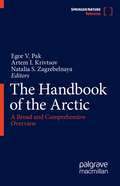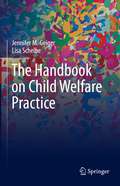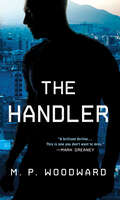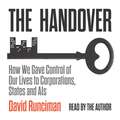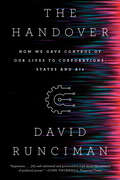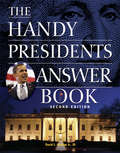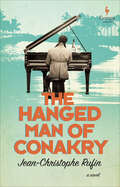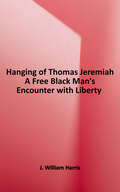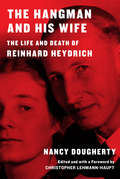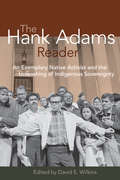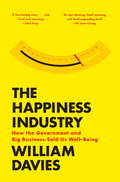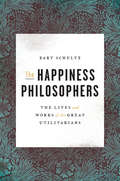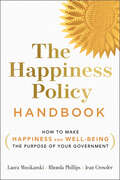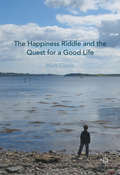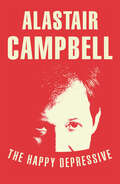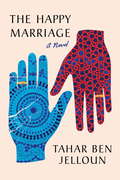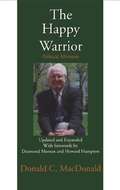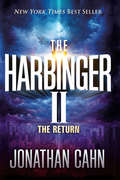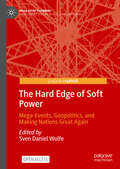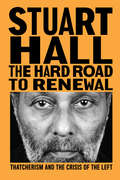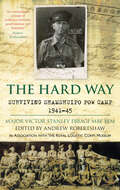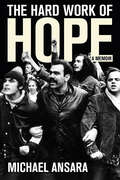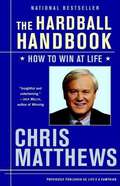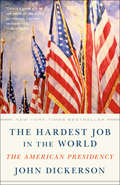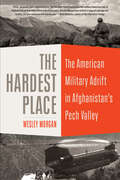- Table View
- List View
The Handbook of the Arctic: A Broad and Comprehensive Overview
by Egor V. Pak Artem I. Krivtsov Natalia S. ZagrebelnayaThis book offers a broad and holistic overview of issues in the Arctic today, a region which is transforming due to changing world order and climate agenda. While new economic opportunities - and with China, as well as other geopolitical players in the region - are emerging, new security challenges are arising as well. In this comprehensive scholarly resource, contributors from around the world and from a broad variety of disciplines share their thoughts on the future of the Arctic, in a manuscript that will be of interest to researchers, economists, and policymakers.
The Handbook on Child Welfare Practice
by Lisa Schelbe Jennifer M. GeigerThis unique, multidisciplinary resource incorporates cutting-edge research and best practices in child welfare into a text that aims to teach and refine advanced child welfare skills for aspiring child welfare professionals. Featuring real-life examples and stories from the field, the handbook discusses existing methods and challenges in the field of child welfare practice. Chapters also include materials for instructors to use in classrooms or training settings. Among the topics covered: Overview of child welfare policies and how the child welfare system worksAssessment tools and strategies used to identify various types of child abuse and neglect Individual, family, and community-level approaches to preventing child maltreatment and preserving families Promoting stability after foster care placement Effective collaboration while working with special populations Clinical supervision in child welfare practice Strategies for healthy professional development of child welfare practitioners The Handbook on Child Welfare Practice is a valuable resource as both a textbook in child welfare practice courses and a practical reference for child welfare professionals. This book will help develop a more knowledgeable and skilled child welfare workforce prepared to address the significant public health concern of child maltreatment.
The Handler
by M.P. WoodwardA disgraced former CIA operative must go back in the field with only his ex-wife as his handler in this electrifying thriller from a former intelligence officer.Meredith Morris-Dale is a CIA case officer and a damn good one...even if this last mission did go terribly wrong. Now she has been summoned back to Langley where she expects to be fired. Instead, she is met by the Deputy Director with stunning news. A single well-placed CIA mole in Iran&’s uranium enrichment program has kept the terrorist nation from building a bomb by sabotaging the performance of their covert centrifuge arrays. But after losing his daughter in an airliner shootdown, the mole wants out—leaving the world on the brink. His one demand: a reunion with the only handler he ever trusted, John Dale—Meredith's disgraced, fired, wayward ex-husband. As Meredith and John struggle through their fraught relationship, a craven CIA political hierarchy, Russian interference, and the rogue spy&’s manipulation, they must reach deep within their shared connection to maintain, recover, or kill the asset.
The Handover: How We Gave Control of Our Lives to Corporations, States and AIs
by David Runciman'The Singularity' is what Silicon Valley calls the idea that, eventually, we will be overrun by machines that are able to take decisions and act for themselves. What no one says is that it happened before.A few hundred years ago, humans started building the robots that now rule our world. They are called states and corporations: immensely powerful artificial entities, with capacities that go far beyond what any individual can do, and which, unlike us, need never die.They have made us richer, safer and healthier than would have seemed possible even a few generations ago - and they may yet destroy us. The Handover distils over three hundred years of thinking about how to live with artificial agency.
The Handover: How We Gave Control of Our Lives to Corporations, States and AIs
by David Runciman“[W]itty and refined . . . Runciman’s point is that the alliance between even a democratic government and a safe-ish A.I. could derail civilization.” —Gideon Lewis-Kraus, New Yorker An eminent political thinker uses our history with states and corporations—“artificial agents” to which we have granted immense power—to predict how AI will remake society. Countless books, news reports, and opinion pieces have announced the impending arrival of artificial intelligence, with most claiming that it will upend our world, revolutionizing not just work but society overall. Yet according to political philosopher and historian David Runciman, we’ve actually been living with a version of AI for 300 years because states and corporations are robots, too. In The Handover, Runciman explains our current situation through the history of these “artificial agents” we created to rescue us from our all-too-human limitations—and demonstrates what this radical new view of our recent past means for our collective future. From the United States and the United Kingdom to the East India Company, Standard Oil, Facebook, and Alibaba, states and corporations have gradually, and then much more rapidly, taken over the planet. They have helped to conquer poverty and eliminate disease, but also unleashed global wars and environmental degradation. As Runciman demonstrates, states and corporations are the ultimate decision-making machines, defined by their ability to make their own choices and, crucially, to sustain the consequences of what has been chosen. And if the rapid spread of the modern state and corporation has already transformed the conditions of human existence, new AI technology promises the same. But what happens when AI interacts with other kinds of artificial agents, the inhuman kind represented by states and corporations? Runciman argues that the twenty-first century will be defined by increasingly intense battles between state and corporate power for the fruits of the AI revolution. In the end, it is not our own, human relationship with AI that will determine our future. Rather, humanity’s fate will be shaped by the interactions among states, corporations, and thinking machines. With clarity and verve, The Handover presents a brilliantly original history of the last three centuries and a new understanding of the immense challenges we now face.
The Handy Presidents Answer Book
by David L HudsonPrevious ed.: The handy presidents answer book / Roger Matuz with Gina Misiroglu and Lawrence W. Baker. c2004.
The Hanged Man of Conakry: A Novel
by Jean-Christophe RufinA minor French official in Guinea must solve the case of a tourist found hanged from a sailboat in this “gem of a diplomatic thriller” (Publishers Weekly, starred review).Having grown up in Romania, Aurel Timescu never quite fit in his native France. A former piano player with the disheveled air of a character from between the wars, nobody can understand how he got to be Consul. Now he’s taken a position in French Guinea, where he passes his time perspiring, drinking Tokay, and composing librettos. Until, that is, a vacationer is found hanging from the mast of a sailboat.How did he end up dead, on a mast, on Aurel Timescu’s watch? Had his personal life been hanging by a thread? Was he hanging around waiting for love to be reciprocated? Had he been hanging out with the wrong crowd? Had he hung his hat on the peg of some quixotic dream?A Prix Goncourt–winning author and former diplomat, Jean-Christophe Rufin brings Aurel to vivid life in a novel that “offers razor-sharp insights into cultural clashes in the former French colony . . . readers will be reminded of Georges Simenon, only better” (Publishers Weekly, starred review)
The Hanging of Thomas Jeremiah: A Free Black Man's Encounter With Liberty
by J. William HarrisThe tragic untold story of how a nation struggling for its freedom denied it to one of its own. In 1775, Thomas Jeremiah was one of fewer than five hundred “Free Negros” in South Carolina and, with an estimated worth of £1,000 (about $200,000 in today’s dollars), possibly the richest person of African descent in British North America. A slaveowner himself, Jeremiah was falsely accused by whites—who resented his success as a Charleston harbor pilot—of sowing insurrection among slaves at the behest of the British. Chief among the accusers was Henry Laurens, Charleston’s leading patriot, a slaveowner and former slave trader, who would later become the president of the Continental Congress. On the other side was Lord William Campbell, royal governor of the colony, who passionately believed that the accusation was unjust and tried to save Jeremiah’s life but failed. Though a free man, Jeremiah was tried in a slave court and sentenced to death. In August 1775, he was hanged and his body burned. J. William Harris tells Jeremiah’s story in full for the first time, illuminating the contradiction between a nation that would be born in a struggle for freedom and yet deny it—often violently—to others.
The Hangman and His Wife: The Life and Death of Reinhard Heydrich
by Nancy DoughertyAn astonishing journey into the heart of Nazi evil: a portrait of one of the darkest figures of Hitler&’s Nazi elite—Reinhard Heydrich, the designer and executor of the Holocaust, chief of the Reich Main Security, including the Gestapo—interwoven with commentary by his wife, Lina, from the author's in-depth interviews.He was called the Hangman of the Gestapo, the "butcher of Prague," with a reputation as a ruthlessly efficient killer. He was the head of the SS, and the Gestapo, second in command to Heinrich Himmler. His orders set in motion the Kristallnacht pogrom of 1938 and, as the lead planner of Hitler's Final Solution, he chaired the Wannsee Conference, at which details of the murder of millions of Jews across Nazi-occupied Europe were toasted with cognac. In The Hangman and His Wife, Nancy Dougherty, and, following her death, Christopher Lehmann-Haupt, masterfully explore who Heydrich was and how he came to be, and how he came to do what he did. We see Heydrich from his rarefied musical family origins and his ugly-duckling childhood and adolescence, to his sudden flameout as a promising Naval officer (he was forced to resign his Naval commission after dishonoring the office corps by having sex with the unmarried daughter of a shipyard director and refusing to marry her). Dougherty writes of his seemingly hopeless job prospects as an untrained civilian during Germany&’s hyperinflation and unemployment, and his joining the Nazi party through the attraction to Nazism of his fiancée, Lina von Osten, and her father, along with the rumor shadowing him of a strain of Jewishness inherited from his father&’s side. And we follow Heydrich&’s meteoric rise through the Nazi high command—from SS major, to colonel to brigadier general, before he was thirty, deputy to Heinrich Himmler, expanding the SS, the Gestapo, and developing the Reich's plans for "the Jewish solution." And throughout, we hear the voice of Lina Heydrich, who was by his side until his death at the age of thirty-eight, living inside the Nazi inner circles as she waltzed with Rudolf Hess, feuded with Hermann Göring, and drank vintage wine with Albert Speer.
The Hank Adams Reader
by David E. WilkinsAccording to Vine Deloria Jr., Hank Adams is the most important Native American of the past sixty years. From his mediation of disputes between the US government and AIM in the 1970s to his key role in the Trail of Broken Treaties, Adams shaped modern Native activism. For the first time Adams' writings are collected, providing a well-rounded portrait of this important figure and a firsthand history of Indian country in the late twentieth century. Professor David E. Wilkins holds the McKnight Presidential Professorship in American Indian Studies at the University of Minnesota.
The Happiness Industry
by William DaviesIn winter 2014, a Tibetan monk lectured the world leaders gathered at Davos on the importance of Happiness. The recent DSM-5, the manual of all diagnosable mental illnesses, for the first time included shyness and grief as treatable diseases. Happiness has become the biggest idea of our age, a new religion dedicated to well-being. In this brilliant dissection of our times, political economist William Davies shows how this philosophy, first pronounced by Jeremy Bentham in the 1780s, has dominated the political debates that have delivered neoliberalism. From a history of business strategies of how to get the best out of employees, to the increased level of surveillance measuring every aspect of our lives; from why experts prefer to measure the chemical in the brain than ask you how you are feeling, to why Freakonomics tells us less about the way people behave than expected, The Happiness Industry is an essential guide to the marketization of modern life. Davies shows that the science of happiness is less a science than an extension of hyper-capitalism.
The Happiness Philosophers: The Lives and Works of the Great Utilitarians
by Bart SchultzA colorful history of utilitarianism told through the lives and ideas of Jeremy Bentham, John Stuart Mill, and its other foundersIn The Happiness Philosophers, Bart Schultz tells the colorful story of the lives and legacies of the founders of utilitarianism—one of the most influential yet misunderstood and maligned philosophies of the past two centuries.Best known for arguing that "it is the greatest happiness of the greatest number that is the measure of right and wrong," utilitarianism was developed by the radical philosophers, critics, and social reformers William Godwin (the husband of Mary Wollstonecraft and father of Mary Shelley), Jeremy Bentham, John Stuart and Harriet Taylor Mill, and Henry Sidgwick. Together, they had a profound influence on nineteenth-century reforms, in areas ranging from law, politics, and economics to morals, education, and women's rights. Their work transformed life in ways we take for granted today. Bentham even advocated the decriminalization of same-sex acts, decades before the cause was taken up by other activists. As Bertrand Russell wrote about Bentham in the late 1920s, "There can be no doubt that nine-tenths of the people living in England in the latter part of last century were happier than they would have been if he had never lived." Yet in part because of its misleading name and the caricatures popularized by figures as varied as Dickens, Marx, and Foucault, utilitarianism is sometimes still dismissed as cold, calculating, inhuman, and simplistic.By revealing the fascinating human sides of the remarkable pioneers of utilitarianism, The Happiness Philosophers provides a richer understanding and appreciation of their philosophical and political perspectives—one that also helps explain why utilitarianism is experiencing a renaissance today and is again being used to tackle some of the world's most serious problems.
The Happiness Policy Handbook: How to Make Happiness and Well-Being the Purpose of Your Government
by Rhonda Phillips Laura Musikanski Jean CrowderBuild a better society through happiness policyThomas Jefferson said that “the purpose of government is to enable the people of a nation to live in safety and happiness.” Yet only now, 270 years later, is the happiness of citizens starting to be taken seriously as the purpose of government.While happiness science is advancing rapidly, and governments and organizations are creating indices for measuring happiness, there is little practical information on how to create policy to advance happiness.Drawing from a deep well of expertise and experience, The Happiness Policy Handbook is the first step-by-step guide for integrating happiness into government policy at all levels. Coverage includes:A concise background on happiness science, indices and indicators, and happiness in public policyTools for formulating happiness policy and integrating happiness into administrative functionsA concept menu of happiness policiesCommunicating happiness policy objectives to media and engaging with the communityA happiness policy screening tool for evaluating the happiness contribution of any policyPolicy perspectives from seasoned experts across sectors.The Happiness Policy Handbook is the essential resource for policymakers and professionals working to integrate happiness and well-being into governmental processes and institutions.
The Happiness Riddle and the Quest for a Good Life
by Mark CieslikThis book examines the meaning of happiness in Britain today, and observes that although we face challenges such as austerity, climate change and disenchantment with politics, we continue to be interested in happiness and living well. The author illustrates how happiness is a far more contested, social process than is often portrayed by economists and psychologists, and takes issue with sociologists who often regard wellbeing and the happiness industry with suspicion, whilst neglecting one of the key features of being human – the quest for a good life. Exploring themes that question what it means to be happy and live a good life in Britain today, such as the challenges young people face making their way through education and into their first jobs; work life-balance; mid-life crises; and old age, the book presents nineteen life stories that call for a far more critical and ambitious approach to happiness research that marries the radicalism of sociology, with recent advances in psychology and economics. This book will appeal to students and academics interested in wellbeing, happiness and quality of life and also those researching areas such as the life course, work-life balance, biographies, aging and youth studies.
The Happy Depressive: In Pursuit of Personal and Political Happiness
by Alastair CampbellAre you happy? Does it matter?Increasingly, governments seem to think so. As the UK government conducts its first happiness survey, Alastair Campbell looks at happiness as a political as well as a personal issue; what it should mean to us, what it means to him. Taking in economic and political theories, he questions how happiness can survive in a grossly negative media culture, and how it could inform social policy. But happiness is also deeply personal. Campbell, who suffers from depression, looks in the mirror and finds a bittersweet reflection, a life divided between the bad and not-so-bad days, where the highest achievements in his professional life could leave him numb, and he can somehow look back on a catastrophic breakdown twenty-five years ago as the best thing that happened to him. He writes too of what he has learned from the recent death of his best friend, further informing his view that the pursuit of happiness is a long game.Originally published as part of the Brain Shots series, the pre-eminent source for high-quality, short-form digital non-fiction.
The Happy Marriage
by Tahar Ben Jelloun"Ben Jelloun is arguably Morocco's greatest living author, whose impressive body of work combines intellect and imagination in magical fusion." --The Guardian In The Happy Marriage, the internationally acclaimed Moroccan author Tahar Ben Jelloun tells the story of one couple--first from the husband's point of view, then from the wife's--just as legal reforms are about to change women's rights forever. The husband, a painter in Casablanca, has been paralyzed by a stroke at the very height of his career and becomes convinced that his marriage is the sole reason for his decline. Walled up within his illness and desperate to break free of a deeply destructive relationship, he finds escape in writing a secret book about his hellish marriage. When his wife finds it, she responds point by point with her own version of the facts, offering her own striking and incisive reinterpretation of their story. Who is right and who is wrong? A thorny issue in a society where marriage remains a sacrosanct institution, but where there's also a growing awareness of women's rights. And in their absorbing struggle, both sides of this modern marriage find out they may not be so enlightened after all.From the Hardcover edition.
The Happy Warrior: Political Memoirs
by Donald MacdonaldOriginally published in 1988, this revised and expanded edition of Donald C. MacDonald’s acclaimed memoirs provides an inside look at provincial politics in Ontario through the eyes of a party leader. Dubbed "the Happy Warrior" by Tommy Douglas, MacDonald led the Ontario CCF/NDP for seventeen years, and continued to sit in the Legislature for twelve years after stepping down as party leader. During his political career, MacDonald played a significant role in the rise of the CCF/NDP, and provided a strong voice for the left wing in the Legislature. He also witnessed and criticized various scandals that plagued ruling parties.
The Harbinger II: The Return
by Jonathan CahnThe Harbinger II will open up the mysteries of the Watchmen, the Half Moon, the Day of Tammuz, the Parchment in the Ruins, the Tree, the Inscription, the Image, the Eastern Gate, and much, much more. It will ultimately lead to mysteries concerning the future, which include the Window, the Island, the Other Mystery Ground, and the Prophecy. <p><p> As with The Harbinger, the revelations of The Harbinger II are completely real and manifesting in the events of our times. And as with the first book, the mysteries are revealed through a narrative. So, The Harbinger II will bring the return of Nouriel, Ana Goren, and the mysterious figure known as “the prophet.” The prophet will now take up the revelation where he left off and open mysteries as stunning and mind-blowing as in the first book. <p> The mysteries will be opened up, as in the prophet’s first appearance, through the giving of ancient seals, but also in dreams and through a little girl as mysterious as the prophet. In The Harbinger II you will be taken on an epic journey from the shores of New England, to the steps of the Supreme Court, to the towering heights of a Manhattan skyscraper, to a boat on the Hudson River, even to the White House and the pedestal of the Statue of Liberty. One thing is for certain: when you finish reading The Harbinger II, you will never see the world the same again. <p> <b>A New York Times Bestseller</b>
The Hard Edge of Soft Power: Mega-Events, Geopolitics, and Making Nations Great Again (Mega Event Planning)
by Sven Daniel WolfeThis open access book explores the linkages between geopolitics and hosting mega-events. It encompasses and transcends the international and domestic dimensions of soft power to unpack how mega-events shape cities and societies through notions of unity and greatness, but also investigates local developments beneath the Potemkin surface of the global spectacle. Drawing on a global range of case studies from Eastern Europe, Western Europe, North America, South America, Africa, the Middle East, Asia, and Australia, this volume features the sensitivity of grounded local research framed within geopolitical perspectives. Together, they present an international and transdisciplinary understanding of the local and global political implications of hosting mega-events. The volume reveals what hides under the mega-event spectacle: problems that – regardless of national context – most often occur to the detriment of host populations. This is an open access book.
The Hard Road to Renewal: Thatcherism and the Crisis of the Left
by Stuart HallStuart Hall's writings on the political impact of Margaret Thatcher have established him as the most prescient and insightful analyst of contemporary ConservatismCollected here for the first time with a new introduction, these essays show how Thatcher has exploited discontent with Labour's record in office and with aspects of the welfare state to devise a potent authoritarian, populist ideology. Hall's critical approach is elaborated here in essays on the formation of the SDP, inner city riots, the Falklands War and the signficance of Antonio Gramsci. He suggests that Thatcherism is skillfully employing the restless and individualistic dynamic of consumer capitalism to promote a swingeing programme of 'regressive modernization'.The Hard Road to Renewal is as concerned with elaborating a new politics for the Left as it is with the project of the Right. Hall insists that the Left can no longer trade on inherited politics and tradition. Socialists today must be as radical as modernity itself. Valuable pointers to a new politics are identified in the experience of feminism, the campaigns of the GLC and the world-wide response to Band Aid.
The Hard Way: Surviving Shamshuipo POW Camp 1941-45
by Andrew Robertshaw Victor Stanley EbbageMajor Vic Ebbage was a Colonel with the Royal Army Ordnance Corps, serving in Hong Kong in 1941, when his garrison was attacked by the Japanese Army. He was captured and taken prisoner to the notorious Hong Kong death camp, Samshuipo, where he was held from 30th December 1941 to August 1945. His story is an extraordinary one of survival against all the odds, but more than that it is a story of how a group of men worked together to improve conditions in the camp for their fellow prisoners. They were offered nothing by their captors, but their constant command of 'improvise', which they learned to do by recycling salvaged materials into everything from homemade nails, cooking pots and plates to surgical instruments, beds and nesting boxes. His diary demonstrates how individuals can work together in almost unimaginable adversity to improve life for their fellow man, and how imagination and innovation can flourish in even the worst conditions. This story is a model of care, humanity and inventiveness.
The Hard Work of Hope: A Memoir
by Michael AnsaraThe Hard Work of Hope takes you into the heady days of 1960s and 1970s activism, chronicling the hopes and strategies of the young people who created the movements that rocked the country.Michael Ansara was on the front lines. In this fascinating memoir, he traces an arc of discovery: from the hope and moral clarity of the Civil Rights Movement to the ten-year struggle to end the war in Vietnam, with its sit-ins, marches, confrontations, and antiwar riots. Ansara takes the reader into the minds of the activists detailing their successes as well as their mistakes. The Hard Work of Hope shows how he learned to become a more effective organizer and build the Massachusetts Fair Share organization. The book explores issues that remain urgent. How does a movement build support when large parts of the country are opposed to its goals? How do you connect with people who disagree with you? How do you build organizations that unite across racial lines? How can we make progress on the unfinished business of the hard work of hope?
The Hardball Handbook: How to Win at Life
by Chris MatthewsWith his more than forty years' experience observing people and politicians in our nation's capital-ten of those years on Hardball, five nights a week-Chris Matthews has learned from the pros what it takes to be a success. Now Matthews shows us what we can learn from the world's most accomplished people and, more important, how we can emulate their best habits to improve our own lives.
The Hardest Job in the World: The American Presidency
by John DickersonFrom the veteran political journalist and 60 Minutes correspondent, a deep dive into the history, evolution, and current state of the American presidency—and how we can make the job less impossible and more productive. <P><P>magine you have just been elected president. You are now commander-in-chief, chief executive, chief diplomat, chief legislator, chief of party, chief voice of the people, first responder, chief priest, and world leader. You’re expected to fulfill your campaign promises, but you&’re also expected to solve the urgent crises of the day. What’s on your to-do list? Where would you even start? What shocks aren’t you thinking about? <P><P>The American presidency is in trouble. It has become overburdened, misunderstood, almost impossible to do. “The problems in the job unfolded before Donald Trump was elected, and the challenges of governing today will confront his successors,” writes John Dickerson. After all, the founders never intended for our system of checks and balances to have one superior Chief Magistrate, with Congress demoted to “the little brother who can’t keep up.” <P><P>In this eye-opening book, John Dickerson writes about presidents in history such a Washington, Lincoln, FDR, and Eisenhower, and and in contemporary times, from LBJ and Reagan and Bush, Obama, and Trump, to show how a complex job has been done, and why we need to reevaluate how we view the presidency, how we choose our presidents, and what we expect from them once they are in office. Think of the presidential campaign as a job interview. Are we asking the right questions? Are we looking for good campaigners, or good presidents? Once a candidate gets the job, what can they do to thrive? <P><P> Drawing on research and interviews with current and former White House staffers, Dickerson defines what the job of president actually entails, identifies the things that only the president can do, and analyzes how presidents in history have managed the burden. What qualities make for a good president? Who did it well? Why did Bill Clinton call the White House “the crown jewel in the American penal system”? <P><P>The presidency is a job of surprises with high stakes, requiring vision, management skill, and an even temperament. Ultimately, in order to evaluate candidates properly for the job, we need to adjust our expectations, and be more realistic about the goals, the requirements, and the limitations of the office. As Dickerson writes, “Americans need their president to succeed, but the presidency is set up for failure. It doesn&’t have to be.” <P><P><b>A New York Times Bestseller</b>
The Hardest Place: The American Military Adrift in Afghanistan's Pech Valley
by Wesley Morgan&“The definitive account of America&’s heroic but ultimately doomed effort in one of Afghanistan&’s most rugged regions.&”—Sebastian Junger, author of Tribe &“A saga of courage and futility, of valor and error and heartbreak.&”—Rick Atkinson, author of the Liberation TrilogyWhen we think of the war in Afghanistan, chances are we're thinking of a small, remote corner of the country where American military action has been concentrated: the Pech and its tributary valleys in Kunar and Nuristan provinces. The rugged, steep terrain and thick forests made the region a natural hiding spot for targets in the American war on terror, from Osama bin Laden to the Islamic State, and it has been the site of constant U.S. military activity for nearly two decades. Even as the U.S. presence in Afghanistan transitions to a drone war, the Pech has remained at the center of it, a testbed for a new method of remote warfare.Wesley Morgan first visited the Pech in 2010, while he was still a college student embedding with military units as a freelancer. By then, the Pech and its infamous tributary the Korengal had become emblematic of the war, but Morgan found that few of the troops fighting there could explain why their remote outposts had been built. In The Hardest Place, he unravels the history those troops didn&’t know, captures the culture and reality of the war through both American and Afghan eyes, and reports on the snowballing American missteps that made each unit&’s job harder than the last as storied outfits like Marines, paratroopers, Rangers, Green Berets, and SEALs all took their turn.Through reporting trips, hundreds of interviews with Americans and Afghans, and documentary research, Morgan writes vividly of large-scale missions gone awry, years-long hunts for single individuals, and the soldiers, Marines, commandos, and intelligence operatives who cycle through, along with several who return again and again to the same slowly evolving fight.As the war drags on through its fourth presidential administration, Morgan concludes that we've created a status quo that could last forever in the Pech, with the military and intelligence agencies always in search of the next target.
